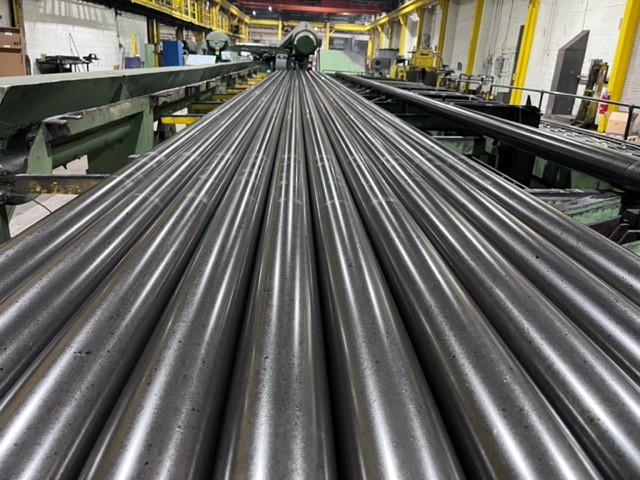
Material Selection
In addition to production, metallurgical or engineering personnel,
experience plays an important role in material selection.
Machinability
Machinability is a prime consideration when it comes to the production of steel. It is measured in surface feet per minute, productivity, tool life, and finish. It is crucial part of the steel selection process.
Size & Shape
While a wide range of sizes are available, standard sizes and lengths should be specified. The shape of the steel can typically be predetermined. Cold finished steel bars come in round, flat, hexagon, and special shapes. However, most shafting and power transmission applications are made from our round bar stock. A wide number of surface finishes are available to the parts designer. The production method will determine the finish, tolerance, and accuracy. The basic methods include: Cold Drawing, Turning, and Grinding & Polishing. These three processes can also be combined with one another as well.
Design Requirements
Design is a major part of the steel process. The end usage of the steel or the conditions under which the part will operate in service will determine which grade of steel should be used.

Production Operations
During production, it is essential that all operations must be carefully performed. Niagara LaSalle’s high strength specialty steels will often eliminate the need for: Additional Heat Treatment Facilities, Increased Floor Space, Investment Savings in Material, Eliminate or Minimize Secondary Operations. Niagara LaSalle offers an extension of your own production facilities by providing materials with qualities in the bar. Some of the strength, straightness, different types of surface finishes, and dimensional accuracy as well as various thermal treatments.
Mechanical Properties
Various mechanical properties are combined together in order to find a steel grade that will fit your needs. There are a variety of different factors to consider when making a steel selection, such as: Wearability, Freedom of Distortion, Surface Hardness, Fatigue Life. Our Stressproof®, Fatigue-Proof®, and e.t.d. 150® specialty steels offer an exclusive combination of properties that are created from either alloy or carbon steel, without the need for a heat treatment.With our specialty steel options, this will reduce the deficiencies that come with heat treating products, such as the increased risk of cracks which is often found in quenched and tempered materials.
Cost Efficiency
There are a variety of economic factors that impact the cost of the steel we create. The end or total cost of the product is something that is always kept in mind. Typically a higher pried material may turn out to be the more economical choice. Production economies, elimination of operations, inventory levels, standardization of grates, larger quantity purchases, material handling, and improved reliability are all factors that attest to the final cost of the product. Majority of the time, these factors are overlooked when discussing cost analysis. Wherever possible, the standard grades (including Niagara LaSalle’s Specialty Steels), sizes, shapes, tolerances, accuracies, should be specified for the best economic value.
Availability
In order to ensure the greatest possibility for availability, the standard and special steel options given should be specified whenever possible. This will ensure we have the product your seeking. They are generally the most readily available for both Mill and Steel Service Centers.
Thermal Treatments
Various heat treatments are available which provide steel bars with controlled properties and qualities important to the selection of steel. In addition to Niagara LaSalle specialty steels which require no further heat treatment the user may select conventional heat treatable steels or purchase heat treated in-the-bar stock. All of the following treatments offer varying degrees of strength and other properties.
Stress Relieving is used to relieve residual stresses in bars that can cause warping and distortion or, following cold drawing, to obtain mechanical properties.
Annealing is used to improve machinability by controlling structure and hardness.
Normalizing is used to primarily make the structures of the steel more homogeneous.
Quench & Tempered is a process pioneered and patented by Niagara LaSalle. Bars are heated and then water quenched for full hardenability. They are then tempered to provide a bar with ultra-fine grain size and excellent bar-to-bar uniformity. The process can be applied to a wide range of carbon and alloy steels.
